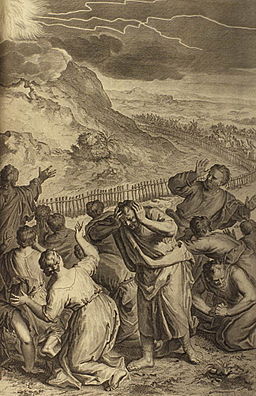Vain Cussing
I’ve stayed away from the oft debated topic of cussing in Christian fiction—until now. Since there are several facets of it to explore, I figured it needed more than one article to hit the key points.
I’m going to start with an obvious one: taking the name of God in vain.
At least, it seems like it would be obvious. The restriction comes from Exodus 20:7 . . .
Thou shalt not take the name of the LORD thy God in vain; for the LORD will not hold him guiltless that taketh his name in vain.
The common understanding is that we should not use God’s name in an empty manner like as part of an expletive. Most people who use “God” or “Jesus Christ” as an expletive are not intending to talk about God or address Him. Therefore He is being referenced in an empty way.
Makes sense, doesn’t it? After all, who among us would be happy to have our named used as an expletive? If I’m in a room and hear, “Rick Copple! Watch where you put that thing!” but it is obvious they are talking to George, that would be degrading to me.
Yet, it may not be all that obvious. Here is a different take on its meaning (warning–cussing used in what some would consider using God’s name in vain):
Though I’d quibble with a point or two, he does make a good central argument about the verse’s meaning. To explain that, let’s take a closer look at the verse.
The Hebrew word translated “vain,” according to Strongs, indicates:
evil (as destructive), literally (ruin) or morally (especially guile); figuratively idolatry (as false, subjective), uselessness (as deceptive, objective; also adverbially, in vain):–false(-ly), lie, lying, vain, vanity.
To use God’s name in vain doesn’t mean simply in an empty way, but in a deceptive, idolatrous, false way.
We who are Christians bear the name of Christ. Are we giving honor to His name or making it meaningless and desecrated by our words and actions? Do we take God’s name upon ourselves in vain?
The one other instance in Scripture referring to vain usage, aside from the second giving of the Ten Commandments in Deuteronomy, lends support to this understanding:
Remove far from me vanity and lies: give me neither poverty nor riches; feed me with food convenient for me: Lest I be full, and deny thee, and say, Who is the LORD? or lest I be poor, and steal, and take the name of my God in vain.
Proverbs 30:8-9
It is the act of stealing which Solomon identifies as taking God’s name in vain, not the use of it in an expletive.
This understanding makes more sense as well. We’re talking the Ten Commandments here—the top ten categories of sins God wanted to highlight and us to follow. Are we to believe that out of all the sins He could pick from, using His name as an expletive would be sin number three? Yeah, not a good thing, but in the top ten?
Within the correct context of being vain, it fits very nicely with the first two. Taking God’s name upon us as one of His, then not dishonoring that name, goes right along with making Him first and not worshiping any idols.
Now let’s take a step back. Does this mean using God’s name in an expletive isn’t what this is talking about, or is it also included?
After all, for the Christian, using God’s name when you are not addressing Him is a false use of His name—one of the meanings of the Hebrew word for vain. It is a false witness about God to call on Him without the intent to do so. If you are addressing God or Jesus Christ, that is one thing. Using His name purely as an expletive, bearing false witness of who He is, is another.
While using God’s name as an expletive may not be the primary meaning of the third commandment, neither is it true that it is excluded from the meaning of that commandment. Rather, it is not the only meaning.
But God is a title, not a name. That term doesn’t apply to the third commandment.
Strictly speaking, this is true. The KJV, as do many translations, use the term “Lord” in place of the Hebrew name for God. In the Hebrew, Exodus 20:7 literally says:
Thou shalt not take the name of Yahweh thy God in vain . . .
It is the name Yahweh that is not to be taken in vain. God is merely His title, as is Lord.
Two problems with this approach.
One, a name is what we call a person. A title can become a name through usage as such. When reporters call out, “Mr. President!” do you think they believe “President” to be his name? When I shepherded a parish, did my parishioners think my name was “pastor” because they addressed me that way constantly?
Is it too much of a stretch to understand that Christians in the West understand God to be our name for Yahweh because we’ve used it that way for hundreds of years? A name refers to a person, no matter what name is used. God equals Yahweh. Both terms point to the same reality.
Two, if the third commandment only referred to using God’s name as an expletive, this argument would have more of a basis. Since we have shown that the third commandment goes much further than that, but refers to taking on God’s name as His child, we are referring to the same reality whether we call Him Lord, God, Yahweh, or Jesus Christ. We represent Yahweh no matter which title or term we use.
It is no longer the term for Yahweh we use in conversation that matters, but to honor the One the name points to.
Any name that points to Him, used as an expletive, violates the intent of not honoring God with our words and actions, degrades His person, and makes the name we bear vain.
Agree or disagree with my conclusions?










































[insert quotation from Screwtape about “Lord’s name in vain” as only cussing]
So this post isn’t so much about the issue of cussing (oh, the flame wars we could wage) than it is expounding upon the third commandment. Okay, then.
It’s always better to go to the Hebrew on things like this. The upshot of the Hebrew word “vain” means “empty” — You shall not lift up the name of the Lord your God in an empty way — i.e., casual, no respect. This most certainly does apply to explicatives involving His name, as well as OMG and other expressions — a sin which appears to be lost on the vast majority of contemporary Christians these days. Any casual, empty use of God’s name must not be a part of the Bible-believing Christian’s vocabulary. Why? Because YHWH said so. We should never toss His name around like it’s just another empty, ordinary, casual word.
Strangely enough, H. G., Strongs breakdown of the word did not contain the definition of “empty.” Though, as the article states, I arrive to the same conclusion, though expanded, via another route as to what “vain” means in the Hebrew.
It’s article #1 on the topic, notleia. Taking the Lord’s name in vain is a form of cussing. The one thing I thought was missing was the debate on using it in fiction to add realism. But I’m guessing that will be in one of the follow-up articles?
I agree with your conclusions, 100%, R.L. Copple.
Yes, we’ll be getting to all that. Figured I’d start here since it is central to defining a key part of any sinfulness of the activity.
Good points in the article, Rick. I agree, sometimes we get caught up on one piece of God’s instruction and miss the whole picture. Cussing using various forms of God’s name is only one way that we may “take the Lord’s name in vain”.
On a related note, I think it’s sad that many Christians use place-holders for an expletive and think that makes it okay. Like using “gosh darn it” (or any number of variations) instead of “God d-n it”. Or using “poo” for “sh–“. If they’re using the words the same way, then the intent and meaning is the same, even if the specific syllables are different.
“Out of the abundance of the heart, the mouth speaks” is what Jesus taught. So when I make an outburst, I stop and ask myself, “What am I really saying here? Why did I burst out with this exclamation? What’s in my heart?”
If I hit my thumb with a nail, what I’m really saying isn’t usually that I want the hammer or the nail damned to hell (for example). Usually I am saying, “OUCH!” But if I go with the flow of worldly culture, I might use a different word. If I’m frustrated because that’s the 10th time that I hit my thumb, then I might really be saying, “Why in the world isn’t this working right? It shouldn’t be this hard to hit the target! I wish I didn’t have to do this stupid job.” But it’s just easier to bust out with a short expletive.
How Christians deal with frustration or pain or conflict does reflect on God. So taking the time to examine our hearts and figure out the root of what’s coming out of our mouths is always time well spent. Especially if we find something that we can repent of and renew our minds to a new and better way, so we can better reflect our Father in heaven.
Thanks, Teddi. Correction noted and made.
Good points, some of which we’ll address in future articles.